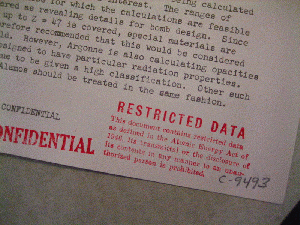There
are very critical issues missing from news reports about the U.S.
government's protection of so called classified information and its pursuit of that data's leakors.
Who classified the data; why; and how is that classification valid?
Scores of news reports have focused on so called classified information leaked out in thousands of documents by WikiLeaks, its agents and entirely separately by Edward Snowden, who exposed the National Security Agency's massive domestic surveillance program.
Those news reports generally discuss the kind of information disclosed. But, no government agent is quoted as specifically justifying why the data became secret in the first place or who decided it should be so classified.
If leakors of so called classified information are to be charged with crimes or heavily criticized in the news media, that information is crucial to protect the accused. As well, the public needs to be assured that those classifying information as secret have not done so simply to cover up their own mistakes or the government's crucial and intentional errors.
Federal prosecutors are in the midst of a court-martial of Pfc. Bradley Manning, the former Army intelligence analyst on a charge of aiding the enemy for sending thousands of classified documents to WikiLeaks. They are still pursuing Julian Assange, the WikiLeaks founder, for his role in widely publishing such documents.
Now, according to news reports, federal authorities are separately investigating Snowden, a 29-year-old defense contractor, for leaking documents and data about the classified domestic surveillance program to Britain's The Guardian newspaper and The Washington Post.
Missing from most daily news reports on the leaks of secrecy issues headlined for months worldwide is this crucial issue. Where is the U.S. government's proof that the hordes of data at the center of these controversies is properly classified? Where is the valid explanation that each and every one of the documents in question has any information that needs a security classification? And, is there any motivation to cover up data embarrassing to the government, its hired security companies or their employees by simply classifying it?
Here is but one big area of doubt created in the title of a detailed article inside George Washington University's version of the National Security Archive: "Systematic Overclassification of Defense Information Poses Challenge for President Obama's Security Review." The article discloses reams of overclassified data in decades of government documents. http://www.gwu.edu/~nsarchiv/nukevault/ebb281/index.htm
It points out that: Pentagon classification authorities are treating classified historical documents as if they contain today's secrets, rather than decades-old information that has not been secret for many years.
Here is the legal definition of secret data: USC - 834 - "Classified information" defined:. the term "classified information" means information which, for reasons of national security, is specifically designated by a United States Government agency for limited or restricted dissemination or distribution.
It would seem logical and simply fair that every single classified document needs accountability and identification from the source or sources classifying it. They need to reveal exactly why it is or was classified, and why that so called classification is valid or still valid. Even legally classified documents need to be constantly monitored to assure their top secret, secret and confidential classifications are still valid today.

Restricted Data stamp
(Image by (From Wikimedia) Alex Wellerstein (User:NuclearSecrets), Author: Alex Wellerstein (User:NuclearSecrets)) Details Source DMCA
Restricted Data stamp by Wikipedia




